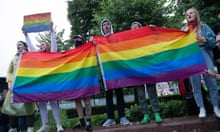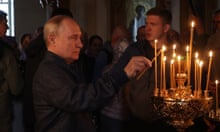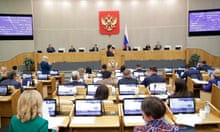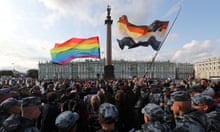A Russian court has ordered two bar workers to be placed in custody, accusing them of roles in an “extremist organisation”, under new legislation criminalising the LGBTQ+ community.
It is the first criminal case of its kind since Russia banned the so-called “international LGBT movement” in November.
“The court chose a preventive measure for the art director and administrator of the Pose bar,” the Orenburg tribunal said. They will remain in custody until 18 May and could face up to 10 years in prison if convicted, according to the court.
The tribunal earlier accused the two suspects of “promoting non-traditional sexual relations among the visitors of the bar”.
Law enforcement raided the bar in March and videos of humiliating detentions of some of the bar’s visitors circulated online.
“The accused, people of non-traditional sexual orientation, acted in premeditation with a group of people … who also support the views and activities of the international public association LGBT,” the court said on Telegram.
Russia has publicly put out only a vague description of what it calls the “international LGBT movement”, paving the way for the prosecution of anyone protecting LGBTQ+ rights or simply identifying with the community.
The director of the League of the Safe Internet, Ekaterina Mizulina, a figurehead of the ultra-traditional faction pushing for repressive laws, hailed the criminal proceedings.
“This is the first criminal case in Russia after the decision of the supreme court to recognise LGBT as an extremist movement,” Mizulina said. She said “local activists” had told the police about the club.
Amnesty International said: “What LGBTQ persons and human rights activists have feared since the end of last year has finally come to pass.”
In 2013 Russian lawmakers banned people from promoting “non-traditional” relationships to children, and pressure on liberal corners of society has grown since.
The Kremlin has further ramped up conservative rhetoric since launching its military assault on Ukraine, casting the conflict as a battle against the west and its liberal values.
In December 2022, Vladimir Putin widened the 2013 law to criminalise any positive public mention of LGBTQ+ people or relationships.
In July last year lawmakers then banned medical intervention and administrative procedures that allowed people to change gender.
In November the supreme court passed the “LGBT movement” ban, under which there have so far been several administrative proceedings resulting in fines and short detentions.
Amnesty said: “The international community must call on Russian authorities to review the homophobic supreme court ruling and immediately stop persecution of LGBTI persons.”







